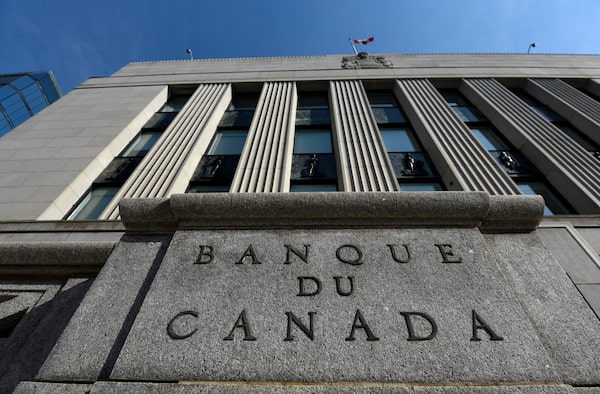
The Bank of Canada building on Wellington Street in Ottawa, on May 31.Justin Tang/The Canadian Press
The Bank of Canada is widely expected to announce its biggest interest rate increase since 1998 this week, continuing to push borrowing costs higher in an effort to keep inflation expectations anchored and to slow the pace of consumer price growth.
The consensus among investors and Bay Street economists is that the central bank will raise its benchmark rate by three-quarters of a percentage point on Wednesday. That would be three times the size of a typical interest rate hike and push the bank’s policy rate well above the prepandemic level.
Higher borrowing costs are already putting pressure on key segments of the Canadian economy, notably the housing market, which has slowed in recent months. But central bank officials have said getting a handle on inflation, and preventing Canadians from losing faith in the bank’s 2-per-cent inflation target, is their overwhelming priority.
Economists predict Bank of Canada will hike key interest rate by 0.75 per cent on Wednesday
“The housing market is flashing deeper signs of strain, with sales falling fast, and prices poised to follow in many regions. And, recession calls have become mainstream for the broader economy,” Bank of Montreal chief economist Douglas Porter wrote in a note to clients last week.
“But those rising risks simply cannot and will not sway the Bank from soldiering on; the risk of recession has to be a secondary consideration to the reality of red-hot inflation.”
Inflation has trended higher for more than a year, hitting an annual rate of 7.7 per cent in May, the highest since 1983. Rising energy, food and shelter prices, in particular, are aggravating affordability challenges for many Canadians and becoming a major political issue.
There are some signs inflation is approaching a peak. Commodity prices have dropped in recent weeks and transportation costs have fallen from record highs. But it is a long way back to the Bank of Canada’s inflation target, and central bank officials are increasingly concerned that high inflation will become baked into people’s psychology.
A pair of surveys published by the Bank of Canada last week showed business and consumer expectations for future inflation are both moving higher. The worry is that this could lead to a wage-price spiral, in which businesses and consumers expect prices to keep moving up, and so set higher prices and demand higher wages in a self-reinforcing cycle.
“The longer inflation remains well above our target, the more likely it is to feed into inflation expectations, and the greater the risk that inflation becomes self-fulfilling,” Bank of Canada deputy governor Paul Beaudry said after the last interest rate increase in June.
“History shows that once high inflation is entrenched, bringing it back down without severely hampering the economy is hard. Preventing high inflation from becoming entrenched is much more desirable than trying to quash it once it has.”
After holding borrowing costs at record lows through the first two years of the COVID-19 pandemic, the Bank of Canada began pushing its benchmark interest rate higher in March. It has moved at three consecutive rate decision meetings, including two oversized 0.5 percentage point rate increases in April and June. This brought the policy rate to 1.5 per cent in June.
Bank officials have said the policy rate may need to reach 3 per cent or higher in the coming quarters, and they have said they are prepared to “act more forcefully” to get there.
“That could involve doing more moves in a row or it could involve bigger moves,” Mr. Beaudry said in June.
The U.S. Federal Reserve announced a 0.75 percentage point rate increase last month, which Bay Street economists say increases the odds of a similar move by the Bank of Canada.
Many of the forces pushing up consumer prices are outside the scope of domestic monetary policy. These include oil and grain prices, which surged following Russia’s invasion of Ukraine, and bottlenecks in global manufacturing and transportation networks.
But the Canadian economy is also overheating, according to Bank of Canada economists. That means demand for goods and services is outstripping the economy’s capacity to supply them.
This shows up most clearly in the elevated number of job vacancies and record-low rate of unemployment, which hit 4.9 per cent in June.
Higher interest rates are aimed cooling demand throughout the economy. The challenge for the Bank of Canada is not doing too much and pushing the economy into recession.
Last week, Royal Bank of Canada became the first large Canadian bank to forecast a recession, starting in 2023. RBC economists Nathan Janzen and Claire Fan tempered their prediction by saying it would be a “moderate and short-lived” recession.
Economic data has been a underwhelming heading into this week’s rate decision. Canada’s economy appears to have slowed unexpectedly in May, according to preliminary estimates from Statistics Canada. Likewise, the country lost 43,000 jobs last month, Statscan reported on Friday.
These results are unlikely to knock the Bank of Canada off course, said Derek Holt, head of capital markets economics at Bank of Nova Scotia.
“The Bank of Canada is very likely to ignore a surprise loss of 43,000 jobs in June. Their fixation is upon their inflation mandate with inflation running at about four times their 2 per cent target,” Mr. Holt wrote in a note to clients on Friday.
“They likely realize that they’ll have to break a few tea cups along the path toward engineering cooler inflation through a combination of monetary tightening with a possible eventual assist from supply chains.”
The Bank of Canada will also published new economic growth and inflation forecasts on Wednesday in its quarterly Monetary Policy Report.
Your time is valuable. Have the Top Business Headlines newsletter conveniently delivered to your inbox in the morning or evening. Sign up today.
 Mark Rendell
Mark Rendell